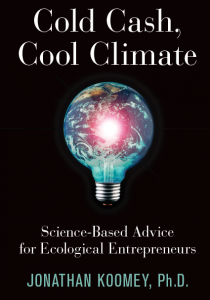Book review: Cold Cash, Cool Climate by Jonathan Koomey
"The best way to predict the future is to invent it."
Alan Kay
 Jonathan Koomey's new book Cold Cash, Cool Climate: Science-Based Advice for Ecological Entrepreneurs puts forth an intriguing idea – entrepreneurs are one of the keys to meaningful, timely climate action. Society needs to make drastic changes to avoid dangerous global warming. However, institutions such as the government and big business only change slowly and incrementally, except under exceptional circumstances.
Jonathan Koomey's new book Cold Cash, Cool Climate: Science-Based Advice for Ecological Entrepreneurs puts forth an intriguing idea – entrepreneurs are one of the keys to meaningful, timely climate action. Society needs to make drastic changes to avoid dangerous global warming. However, institutions such as the government and big business only change slowly and incrementally, except under exceptional circumstances.
Koomey argues forcefully that it's the very nature of entrepreneurs that make them an important part of the solution. While institutions often fear and resist change, entrepreneurs embrace it. The changes required are so large, no part of the economy will be untouched. Most people look at the enormity of this issue and despair. But entrepreneurs are famously scornful of the phrase “it can’t be done” and see opportunity.
This is not to say entrepreneurs are the magic bullet. One of the key points that Koomey makes is that we need to be addressing climate change on many fronts. The key to speeding up the change is to make the systems that are causing the climate problem obsolete more quickly. What entrepreneurs do is develop replacements that are so much better than to existing ways of doing things that people are willing to "upgrade" to gain the advantages of the new technology.
Koomey uses salt as a metaphor. In the old days, salt was indispensable for preserving meat. Then it was made obsolete by a new technology: refrigeration. We need to turn fossil fuel into salt. To achieve this, Koomey runs through a core set of springboard ideas, include a focus on whole system design, the concept of "working forward toward a goal", the critical role of energy efficiency, the importance of accurate emissions inventories, the use of information technology to accelerate institutional change, and the coming explosion in ultra-low-power sensors that scavenge power from light, heat, motion or even stray radio signals.
Now I must confess, economics and business opportunities are not really my forte. However, there's plenty of science in there to sink your teeth into. The first few chapters outline the science in a user-friendly, readable manner, explaining what's happening to our climate and the reasons why we need serious, significant action and fast. My ears did prick up when I reached Chapter 7: Talking to Skeptics. You'll have to indulge me if I excerpt the section titled “There’s an app for that”:
The single most important web site for addressing claims of climate deniers is Skeptical Science. It lists every argument made by the deniers and summarizes what the peer-reviewed scientific literature says about the topic. In fact, Skeptical Science even has apps for iOS, Android, and Nokia phones, so you can access it while on the move. This is especially handy when you’re at a party and someone makes an incorrect statement about climate—you can then quickly find the exact issue and show why their concern is unfounded. John Cook has also summarized some of the key arguments about climate science in teaching materials that are now being translated into many languages and has also recently completed The Debunking Handbook, which is a short summary of how to most effectively respond to the denier’s claims.
Koomey also suggests a higher-level approach that he’s found particularly effective:
If you hear someone using such talking points, try asking the speaker these questions: “Do you feel qualified to judge the current findings of the science on combustion, or gravity, or quantum physics? No? Why then do you opine on a topic that is equally complex but upon which you have no more mastery? Why do you think your judgment on these complex issues is the equal of that of people who have studied the topic for decades?”
Typically the speaker will reply with some statement of authority, like “I’ve studied engineering for years”, or “I’m a weather forecaster”, or “my uncle Joe the physicist said so”. Such responses are beside the point. Unless the speaker is an expert in the field, their opinions should be given no more weight than any other uninformed observer. Would you ask your allergist about the heart surgery your cardiologist recommends?
This book is written for entrepreneurs who are looking for business opportunities in climate change, with Koomey acting in the role of the scientific advisor to a start-up company. But while the book is about technological and business innovation, it ends with the important thought that innovation of our values is also important. Changing the way we think about our responsibility to each other and future generations is just as powerful as new technologies in opening up new possibilities.
Jonathan Koomey's book Cold Cash, Cool Climate: Science-Based Advice for Ecological Entrepreneurs is also available as a Kindle ebook.
Posted by John Cook on Monday, 1 April, 2013
 Jonathan Koomey's new book Cold Cash, Cool Climate: Science-Based Advice for Ecological Entrepreneurs puts forth an intriguing idea – entrepreneurs are one of the keys to meaningful, timely climate action. Society needs to make drastic changes to avoid dangerous global warming. However, institutions such as the government and big business only change slowly and incrementally, except under exceptional circumstances.
Jonathan Koomey's new book Cold Cash, Cool Climate: Science-Based Advice for Ecological Entrepreneurs puts forth an intriguing idea – entrepreneurs are one of the keys to meaningful, timely climate action. Society needs to make drastic changes to avoid dangerous global warming. However, institutions such as the government and big business only change slowly and incrementally, except under exceptional circumstances.
